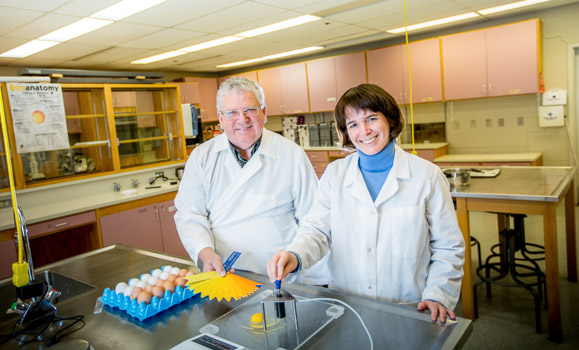Derek Anderson’s research team examines the quality and composition of eggs produced by hens fed marine byproducts and plant oils. Their challenge? Figuring out a way to elevate the healthy fatty acid profile of eggs to benefit of the overall heart health of those who eat the eggs.

“We’ve tried to enhance eggs through the consumption of lobster and crab meal but the eggs may have a bit of a fishy taste which would not be palatable to all consumers,” explains Dr. Anderson, whose team also includes Janice MacIsaac and Ming Gong. Flax seed oil had been considered an option, but it isn’t stable enough to maintain good quality—and the hens simply don’t like the taste of it. “That makes it difficult to get enough flax in the bird to elevate their levels of Omega-3 fatty acids,” Dr. Anderson says.
According to the Canadian Food Inspection Agency, eggs that are considered enhanced must contain 0.3 grams or more per egg of Omega-3 fatty acids.
Next up? “We’re now looking at canola and camelina oil as alternatives to flax because we think they have more stable oils, have a good profile of fatty acids and the oil itself will not be difficult to feed to hens.”
Canola oil itself contains no omega-3 fatty acids but hens will convert the oil into the essential fatty acids but not to the level of fish meal.
Research continues at the Faculty of Agriculture to enhance our eggs directly while also trying to give the hen the opportunity to make the conversion.
Breakfast really is the most important meal of the day!
Recent News
- Look Who's Talking ‑ Robert Larsen
- Lifting our communities
- FAFU Students Celebrate Mid‑Autumn Festival in Cox Kitchen
- Growing with Confidence: Shirley Thorn’s Journey as a Master Gardener in Training
- Flu shot Clinic on campus
- Bringing Worlds Together
- Funding Announced for Organic Science Cluster 4: Advancing the Sustainability of Canadian Agriculture
- Annapolis Royal Historic Gardens Field Trip
